George Byrne,
Bennekerry,
Co Carlow
George is a busy man this weather, between moving grain, spraying crops, spreading organic manure and even installing solar panels on a grain store.
Stubble cultivation has been carried out over the past while and the focus is now turning to planting oilseed rape. George plans to increase the area of oilseed rape this year to improve his crop rotation and there is also a good price for rape at present, so it may help to reduce some of the financial risk.
Slurry spreading and incorporation is on the agenda this week and rape will be planted into these fields. Cattle and pig slurry, along with farmyard manure, will also be applied ahead of winter cereal crops.
George has noticed crops coping a lot better where organic manure has been applied. Sugar beet and beans are both lasting well at present. The Alisha sugar beet was sprayed with a fungicide, Escolta, at a rate of 0.33l/ha and boron was also applied at that time.
George plans to increase the area of oilseed rape this year to improve his crop rotation
The sugar beet had been struggling in the dry conditions, but George noted that he was lucky that they got 40mm of rain a few weeks ago in the thunder showers.
Grain is still being moved at present. The spring barley made malting specifications, with protein contents struggling to stay under 10.4%. Moisture content was all around 14% and yield averaged about 2.9t/ac. Winter wheat reached 4.2t/ac on the drier ground and 5.6t/ac on heavier ground. Moisture contents on the winter wheat hit 13-15% and the KPH (kilogrammes per hectolitre) was around 80 on most of the crop. Some of the winter wheat straw was chopped and incorporated.
Spring beans were planted on 14 March and George noted that they are still about three weeks away from harvesting. The pods are still green.
A big job being undertaken at present is the installation of solar panels on the farm to supply the energy to keep air through the grain. This will hopefully reduce costs on-farm and also reduce energy-related emissions.
Eamonn Cogan,
Slane,
Co Meath
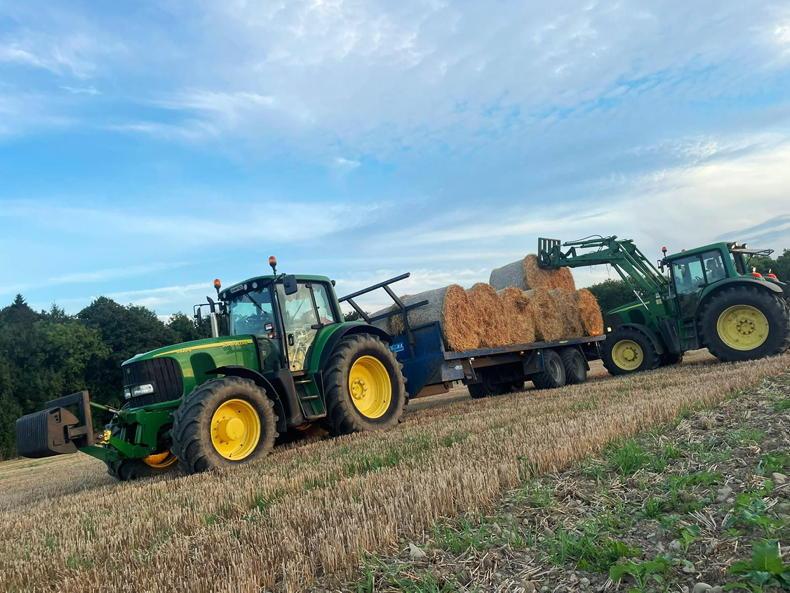
Clearing the last of the straw in Co Meath.
All harvesting has been completed for the past two weeks, straw has been baled and cleared and a significant area of winter oilseed rape has been planted for next season.
Looking at the performance of different wheat varieties, Eamonn said that Graham was once again his number one performer in 2022. It averaged about 4.75t/ac at 14% to 15% moisture. He had no yields that hit or exceeded 5t/ac.
Other varieties also did quite well, but RGT Saki was disappointing. It is prone to septoria and got hit badly by this disease late in the season, which pulled its yield down to around 4t/ac.
Graham will once again be a significant variety for Eamonn for the coming season. He also intends to plant an amount of Dawsum for the year ahead and would like to plant some Champion if seed is available. The area planted to winter barley will be decreased slightly this year.
On the straw front, everything that was due to be baled was baled and the stubbles have been cleared. Eamonn chopped the straw from the oats and the oilseed rape.
He also chopped straw last year and explained that the benefits from this can already be seen, as there is a lot more life in those fields.
Rape planted
Planting of winter oilseed rape was completed at the end of last week. The 200 plus acres sown for 2023 were split between DK Expansion, DK Exstar and LG Aviron. This area has since been sprayed pre-emerge with Rapsan Turbo for weed control, as there were some showers about to help activity.
The rape area also received two 50kg bags per acre of 10:10:20. Eamonn did not have access to organic manures this year and the 10:10:20 cost €950/t. He indicated that he might have difficulty getting it today.
Parts of the sown area were treated with pellets where there are regular slug problems. However, there is no evidence of slug damage so far this season.
Other jobs that are ongoing include bits of drainage, subsoiling tramlines and moving the last of the grain out of sheds.
Kenny Dunne,
Eglinton,
Co Derry
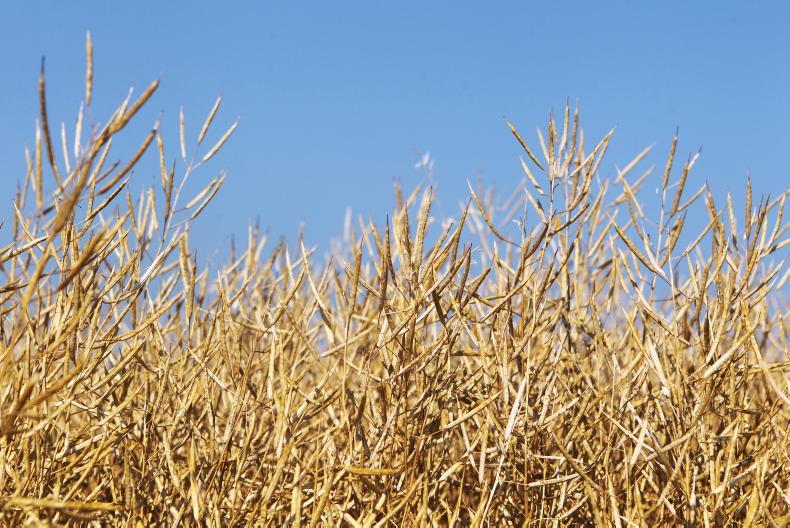
A crop of oilseed rape.
Kenny Dunne was waiting for the mist to clear to cut spring barley on Wednesday morning when he spoke to the irish Farmers JournaL. Not all of the crop was fit to be cut and straw was still somewhat green in some parts, but Kenny was hoping to get 100ac, which was fit, cut and in the shed before rain comes at the weekend.
That’s the last cereal crop to be harvested on the farm, but the 2023 season has already started. Kenny planted winter oilseed rape last week, DK Exsteel went in. The oilseed rape area will stay similar to other years on the farm. Kenny usually plants 30-40ac, depending on what way the rotation falls in any given year.
Winter oilseed rape was cut a few weeks ago and yielded 1.98t/ac at 9-9.5% moisture content. Much of the crop was forward sold at a good price to a mill, so Kenny was happy with it.
Germination is good and crops were clean on inspection during the year
The winter wheat yielded an average of 3.96t/ac at 17% moisture content, while the spring oats reached 2.6t/ac at 14% moisture content. Kenny noted that there was some bird damage in the spring oats crop.
Kenny is very happy with grain quality this year, which is very important for his seed business. Germination is good and crops were clean on inspection during the year.
Kenny noted that there is big demand for winter barley seed at present. His own winter barley yielded an average of 3.6t/ac and he was very happy with the crop. The highest-yielding field reached 3.9t/ac. One sandy field with a manganese deficiency was down at 2.8t/ac.
Straw is moving well. Everything is being baled up at present and 4x4 round bales are moving for £20/bale.
Overall, Kenny is happy with crop yields and progress and is very busy at present, between harvesting, processing grain, seed orders and getting straw baled.
George Byrne,
Bennekerry,
Co Carlow
George is a busy man this weather, between moving grain, spraying crops, spreading organic manure and even installing solar panels on a grain store.
Stubble cultivation has been carried out over the past while and the focus is now turning to planting oilseed rape. George plans to increase the area of oilseed rape this year to improve his crop rotation and there is also a good price for rape at present, so it may help to reduce some of the financial risk.
Slurry spreading and incorporation is on the agenda this week and rape will be planted into these fields. Cattle and pig slurry, along with farmyard manure, will also be applied ahead of winter cereal crops.
George has noticed crops coping a lot better where organic manure has been applied. Sugar beet and beans are both lasting well at present. The Alisha sugar beet was sprayed with a fungicide, Escolta, at a rate of 0.33l/ha and boron was also applied at that time.
George plans to increase the area of oilseed rape this year to improve his crop rotation
The sugar beet had been struggling in the dry conditions, but George noted that he was lucky that they got 40mm of rain a few weeks ago in the thunder showers.
Grain is still being moved at present. The spring barley made malting specifications, with protein contents struggling to stay under 10.4%. Moisture content was all around 14% and yield averaged about 2.9t/ac. Winter wheat reached 4.2t/ac on the drier ground and 5.6t/ac on heavier ground. Moisture contents on the winter wheat hit 13-15% and the KPH (kilogrammes per hectolitre) was around 80 on most of the crop. Some of the winter wheat straw was chopped and incorporated.
Spring beans were planted on 14 March and George noted that they are still about three weeks away from harvesting. The pods are still green.
A big job being undertaken at present is the installation of solar panels on the farm to supply the energy to keep air through the grain. This will hopefully reduce costs on-farm and also reduce energy-related emissions.
Eamonn Cogan,
Slane,
Co Meath

Clearing the last of the straw in Co Meath.
All harvesting has been completed for the past two weeks, straw has been baled and cleared and a significant area of winter oilseed rape has been planted for next season.
Looking at the performance of different wheat varieties, Eamonn said that Graham was once again his number one performer in 2022. It averaged about 4.75t/ac at 14% to 15% moisture. He had no yields that hit or exceeded 5t/ac.
Other varieties also did quite well, but RGT Saki was disappointing. It is prone to septoria and got hit badly by this disease late in the season, which pulled its yield down to around 4t/ac.
Graham will once again be a significant variety for Eamonn for the coming season. He also intends to plant an amount of Dawsum for the year ahead and would like to plant some Champion if seed is available. The area planted to winter barley will be decreased slightly this year.
On the straw front, everything that was due to be baled was baled and the stubbles have been cleared. Eamonn chopped the straw from the oats and the oilseed rape.
He also chopped straw last year and explained that the benefits from this can already be seen, as there is a lot more life in those fields.
Rape planted
Planting of winter oilseed rape was completed at the end of last week. The 200 plus acres sown for 2023 were split between DK Expansion, DK Exstar and LG Aviron. This area has since been sprayed pre-emerge with Rapsan Turbo for weed control, as there were some showers about to help activity.
The rape area also received two 50kg bags per acre of 10:10:20. Eamonn did not have access to organic manures this year and the 10:10:20 cost €950/t. He indicated that he might have difficulty getting it today.
Parts of the sown area were treated with pellets where there are regular slug problems. However, there is no evidence of slug damage so far this season.
Other jobs that are ongoing include bits of drainage, subsoiling tramlines and moving the last of the grain out of sheds.
Kenny Dunne,
Eglinton,
Co Derry

A crop of oilseed rape.
Kenny Dunne was waiting for the mist to clear to cut spring barley on Wednesday morning when he spoke to the irish Farmers JournaL. Not all of the crop was fit to be cut and straw was still somewhat green in some parts, but Kenny was hoping to get 100ac, which was fit, cut and in the shed before rain comes at the weekend.
That’s the last cereal crop to be harvested on the farm, but the 2023 season has already started. Kenny planted winter oilseed rape last week, DK Exsteel went in. The oilseed rape area will stay similar to other years on the farm. Kenny usually plants 30-40ac, depending on what way the rotation falls in any given year.
Winter oilseed rape was cut a few weeks ago and yielded 1.98t/ac at 9-9.5% moisture content. Much of the crop was forward sold at a good price to a mill, so Kenny was happy with it.
Germination is good and crops were clean on inspection during the year
The winter wheat yielded an average of 3.96t/ac at 17% moisture content, while the spring oats reached 2.6t/ac at 14% moisture content. Kenny noted that there was some bird damage in the spring oats crop.
Kenny is very happy with grain quality this year, which is very important for his seed business. Germination is good and crops were clean on inspection during the year.
Kenny noted that there is big demand for winter barley seed at present. His own winter barley yielded an average of 3.6t/ac and he was very happy with the crop. The highest-yielding field reached 3.9t/ac. One sandy field with a manganese deficiency was down at 2.8t/ac.
Straw is moving well. Everything is being baled up at present and 4x4 round bales are moving for £20/bale.
Overall, Kenny is happy with crop yields and progress and is very busy at present, between harvesting, processing grain, seed orders and getting straw baled.





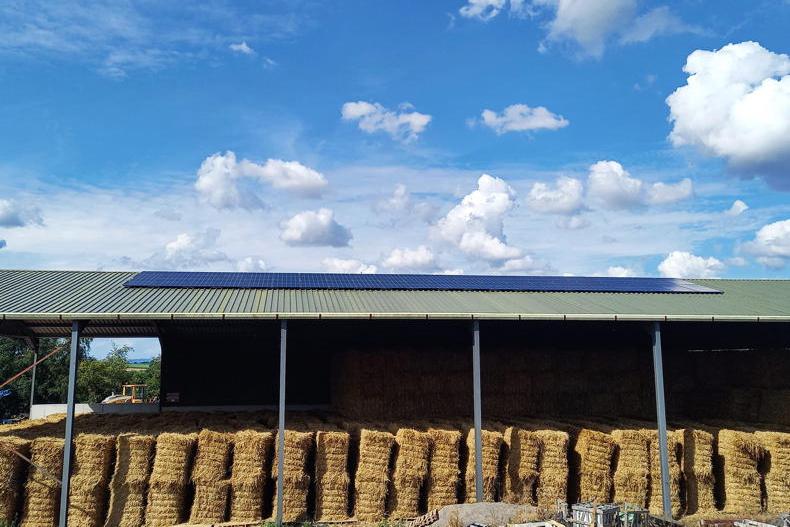

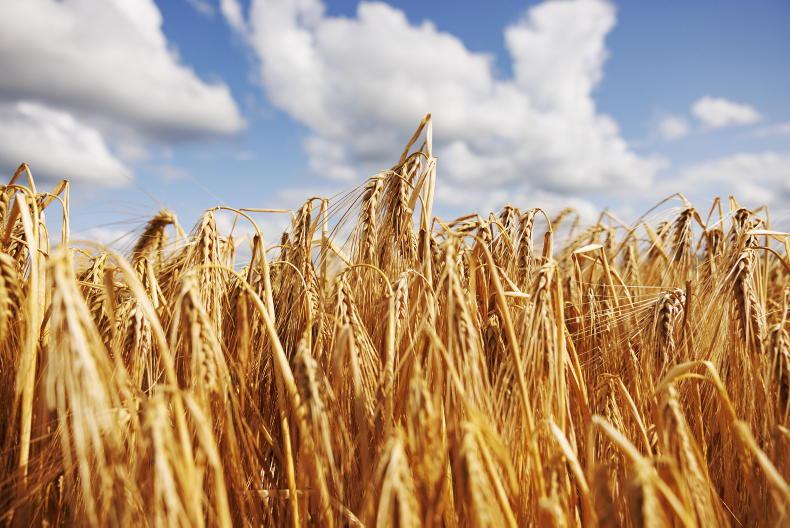

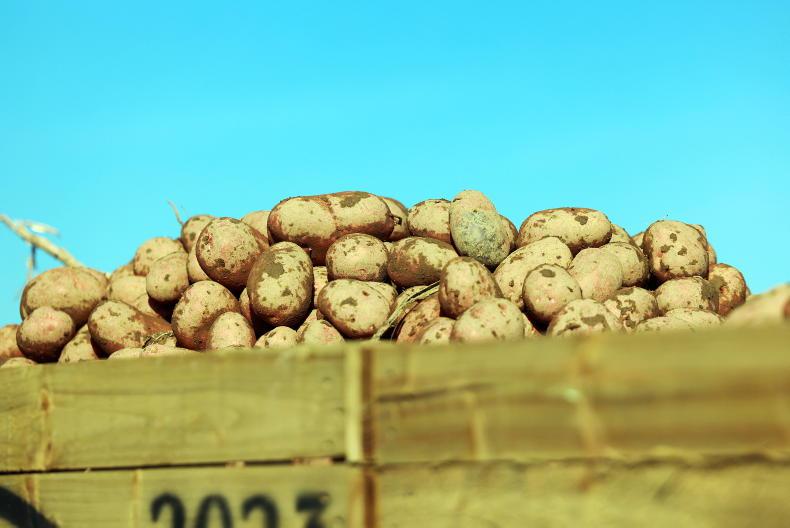
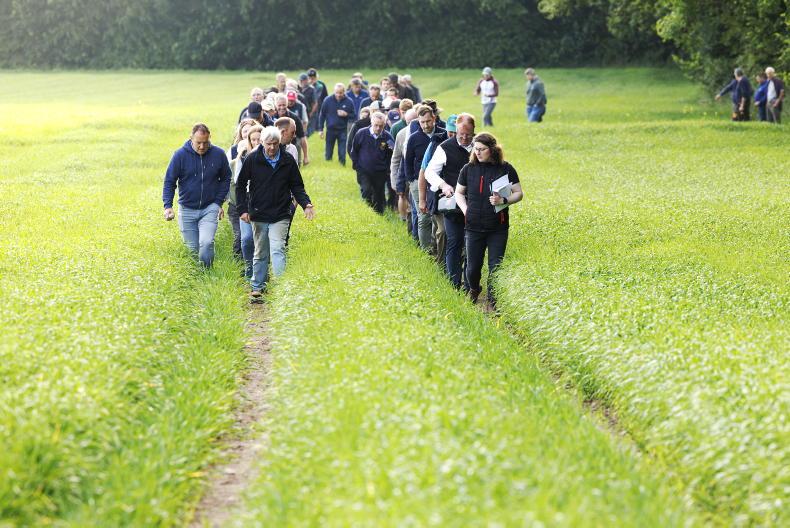

SHARING OPTIONS